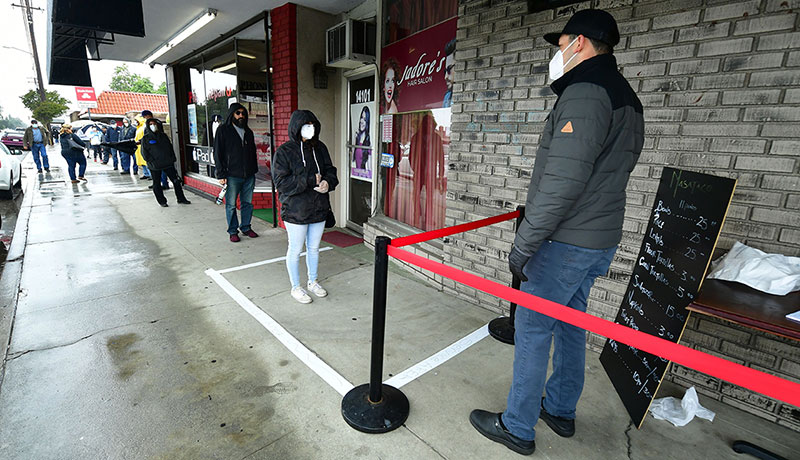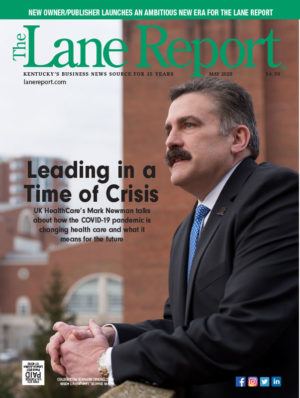
In the face of a global pandemic, the world as we know it has changed drastically, beginning with the cancellation of major sporting events and large gatherings and coming to a screeching halt as all but nonessential businesses closed and workers retreated to their homes in an effort to keep the deadly virus from wreaking more havoc.
Weeks of “social distancing” have now turned into months. While some businesses are slowly and cautiously reopening, leaders are imploring the American public to continue practicing social distancing in hopes of preventing a surge in new cases. Is social distancing the answer to gaining control over COVID-19?
According to a study released by the Institute for the Study of Free Enterprise at the University of Kentucky, the answer is yes.
According to the report, confirmed COVID-19 cases in the commonwealth would have reached a staggering 45,000 by April 25 without any state-imposed measures—compared to the actual total of confirmed cases on that date, which was 3,905.
 Charles Courtemanche and Aaron Yelowitz, professors in the Gatton College of Business and Economics, along with ISFE faculty affiliates developed a model based on differences in the scope and timing of policies implemented across the Midwest and the South. The goal was to predict the number of confirmed cases in Kentucky—had the state not imposed restrictions and relied instead on voluntary actions.
Charles Courtemanche and Aaron Yelowitz, professors in the Gatton College of Business and Economics, along with ISFE faculty affiliates developed a model based on differences in the scope and timing of policies implemented across the Midwest and the South. The goal was to predict the number of confirmed cases in Kentucky—had the state not imposed restrictions and relied instead on voluntary actions.
According to the model, the state’s measures have prevented more than 90% of confirmed cases. Although the authors did not directly examine deaths, combining the estimated reduction in cases with the COVID-19 fatality rate in Kentucky suggests approximately 2,000 lives were saved as of the time the study was released in late April.
“Returning to partial restrictions without a broader shelter-in-place directive may not be enough to contain the spread of the virus,” said Courtemanche, director of the ISFE. “However, the public health benefits from strong social distancing restrictions need to continue to be weighed against the massive economic losses that disproportionately affect low-wage sectors of the economy.”
The study concluded that shelter-in-place orders like Kentucky’s “Healthy at Home” initiative were particularly effective at preventing COVID-19 infections.
However, the study found that bans on group gatherings and public-school closures that were not accompanied by a shelter-in-place order were not as effective—suggesting that people were engaged in other types of social interaction that continued to spread the virus.
For a closer look at the report, visit http://isfe.uky.edu
How Personality Affects Your Response to Crisis
University of Louisville researcher Michael Cunningham is investigating what factors, including personality, influence individual decisions on whether to take preventative measures that could help stymie the spread of coronavirus.
“We want to know where those attitudes and mindsets come from,” said Cunningham, a professor of communications. “It’s not just whether you’re going to wear a mask, but the personality factors that are influencing your decision to wear or not wear.”
Working with the colleagues at York College of Pennsylvania and assessment and survey company FifthTheory in Chicago, Cunningham has developed a Coronavirus Behavioral Health Mindset survey that measures three key dimensions: a person’s individual sense of responsibility to help prevent the spread of the virus, willingness to engage in protective measures, and willingness to practice social distancing.
The anonymous participants also will answer questions on their personality. From those answers, the researchers will be able to determine where the participant falls on the Big Five, or “OCEAN,” personality measures: Openness to experience, Conscientiousness, Extroversion, Agreeableness and Neuroticism.
The survey, which is available at bit.ly/3fsWH0p, is open to anyone wishing to participate.
Participants will be asked to take the survey again a few weeks later, to see if anything has changed.
“Scientists have a lot of experience measuring attitudes about workplace safety and driver safety,” he said. “But how individuals think about 24/7 virus prevention safety is a new frontier.”
Cunningham hopes to complete the survey by late May or early June.




















Add Comment